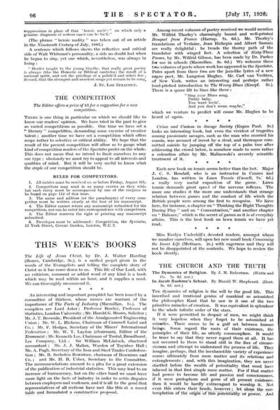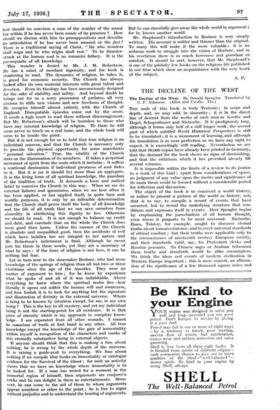THE CHURCH AND THE TRUTH
The Dynamics of Religion. By J. M. Robertson. (Watts and
Co. 78. 6d. net.) .
In Jacob Boehme's School. By Harold W. Shepheard. (Dent. 3s. 6(1. net.) THE dynamics of religion is the will to the good life. This inscribed and irrational genius of mankind so astonished the philosopher Kant that he saw in it one of the two primitive miracles of creation. It was equivalent in splendour to the whole infinite order of the stars. .- If it were permitted to despair of men, we might think it very hopeless when they forget to be astonished at miracles. There seems to be a gulf set between human beings. Some regard the roots of their existence, the principles of their life, as utterly commonplace. It would he truer to say that they never regard them at all. It has not -occurred to them to stand still in the flux of circum- stances. and attempt to understand the process- of life. They imagine, perhaps, that the inexhaustible variety of experience comes ultimately from mere matter and its relations and entanglements ; and, with this imagination, they are never startled before the wealth of potentiality that must have inhered in that first simple mere matter. For if that matter had power to become life and passion and consciousness, if it were protoplasm and germ of all present existence, then it would be hardly extravagant to worship it. Not even this enters their heads, however ; let alone the con- templation of the origin of this potentiality'of pow=er. And
how should we convince a man of the wonder of the moral law within if he has never been aware of its presence ? How should we discuss with him its presuppositions and describe
its articulation if he has never been amazed at the fact? There is a traditional saying of Christ, " He _who wonders shall reign and he who reigns shall rest." To be thunder- struck at the human soul is no romantic fallacy. It is the pre-requisite .of all knowledge.
This wonder is denied to Mr. J. /if. Robertson. He has a mind. of mordant ingenuity, and his book is
chastening to read. The dynamics of religion, he takes it,
is greed for economic security. The Church has always looked-after its own material interests with great talent and
devotion. Even its theology has been unconsciously designed
for the sake of stability and safety. And beyond doubt he brings out for us a sorry procession of prelates, all very anxious to stifle new visions and new freedoms of thought.
He occupies himself almost entirely with the Church of England.-', -Disreputable ipisodes come out by the score.- It needs a high heart to read them without discouragement. But Mr. Robertson's attack will be harmless to those who have any internal knowledge of religion. To them he will seem never to touch on a real issue, and the whole book will seem to be beside the point.
But it. is-not enough for us to hold that true religion is an individual concern, and that the Church is necessary only to provide the physical -opportunity for some anarchistic " •personal salvation." True, the vitality of the Church rests on the illumination of its members. It takes a perpetual increment of spirit from the souls which it includes : it suffers
a continual diminution if individual greatness of soul fades in it. But it is (or it should be) more than an aggregate.
It is the-living form of all spiritual knowledge, the guardian of the tradition of truth.. It demands a keen and radical belief to conceive the Church in this way. When we see its
external failures and ignominies, when we see how often it has been applied, or has applied itself, in quite base and worldly purposes, it is only by an inflexible determination
that the Church shall prove itself the body of all knowledge and the life of all truth that we can save ourselves from absurdity in attributing this dignity to her. Otherwise
we should be mad. It is not enough to balance up credit and debt, and conclude that on the whole the Church does more good than harm. Unless the essence of the Church is absolute and unqualified good, then the accidents of evil which have befallen her are integral to her nature and Mr. Robertson's indictment is final. Although he never puts his thesis in these words, yet they are a summary of what he says : if the force of religion is not love, it can be nothing but fear.
Let us turn now to the shoemaker Boehme, who had more knowledge of the springs of religion than all but two or three
Christians since the age of the Apostles. They were no
matter of argument to him ; for he knew by experience what he spoke of and all of it was indubitable. Above
everything he knew where the spiritual realni lies—how
literally it opens out within the human will and awareness, and how foolish it is to look for anything but the signature
and illustration of divinity in the external universe. Where
is being to be known by intuition except, for me, in my own being ? This is the key to all mystery, and yet my individual being is not the starting-point for all existence. It is that
piece of eternity which is my approach to complete know- ledge. I am separated from all other monads. I cannot be conscious of truth at first hand in any other. All true knowledge except the knowledge of the gate of immortality within myself is recognition of the characters and marks of this eternally substantive being in external objects.
If anyone should think that this is making a fuss about nothing, he is wrong by the whole depth of the universe.
It is raising a guide-post to everything. We fuss about
nothing if we compile blue books on immortality or catalogue evidence for the Survival of the Ghost ; for such an activity
shows that we have no knowledge where immortality is to he looked for. If a man has rested for a moment in the immortal region of himself, then arguments are conjurer's tricks and he can delight in them as entertainments. More- over, he can come to the aid of those to whom arguments appear somehow or other to the point • he _free to argue without prejudice and to understand the Letiring of arguments But he can cheerfully give away the whole world in argument ; for he knows another world.
Mr. Shepheard's introduction to Boehme is very simply written. His account is milder and thinner than the original.. To many this will make it the more valuable : it is an arduous work to struggle into the vision of Boehme, and in , his revelation there is as much fierceness and grandeur as . comfort. It should be said, however, that Mr. Shepheard's is one of the pitifully few books on the religious life published in our time which show an acquaintance with the very heart of -the subject.
A. P.











































 Previous page
Previous page